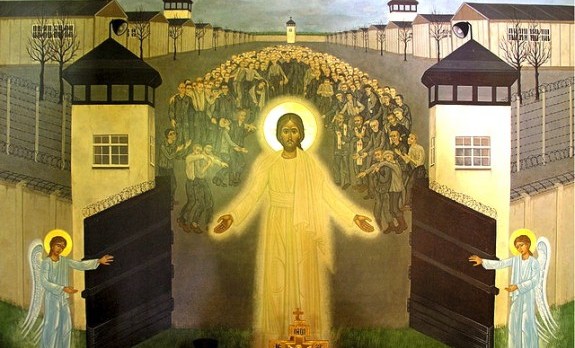For audio of this homily, from the 11:30 am Mass, click the green arrow below.
Last week, we marked the anniversary of D-Day, the invasion that began the end of World War II. If you go on the Internet, you can find some remarkable stories of Catholic priests who ministered to the soldiers – and how some of the priests spent the war. Many were martyrs for the faith, who died while administering the sacraments.
But some of the most moving stories I found weren’t about the priests who were at the front lines—but rather, the ones who spent the war behind barbed war.
They were the Catholic priests of Dachau.
If you want to fully grasp what we are doing today – what we are celebrating on the feast of Corpus Christi—you should hear some of their stories.
Dachau, of course, was one of the most notorious death camps of the Second World War. And many people sent there were Catholic priests, considered to be enemies of the state. The priests weren’t usually executed – at least, not in the way the Jewish prisoners were. Instead, they were worked to death. They did hard labor. They were used in medical experiments. They were starved. They were tortured and beaten in the most inhuman ways.
But in the middle of this nightmare, there was one inexplicable saving grace: Mass. While the Polish priests were denied even the most basic rights, in Dachau German priests were at least permitted to say Mass. The prisoners converted a cellblock into a chapel. They made their own vestments. They even made a monstrance for the Blessed Sacrament. One priest wrote after the war:
“In addition to our simple wooden monstrance, we had another one for important feasts. It sparkled like real silver, yet it had been made from empty tin boxes. An Austrian communist prided himself, on the fact that he made this monstrance secretly in the workshop under the eyes of the SS. Solemn Divine Services were forbidden, as was also every form of religious activity outside the chapel. During the day, no one was permitted to enter the chapel.”
But the chapel contained the Blessed Sacrament. And often prisoners would risk their lives to go there and pray.
One of them was Fr. Marcel Pasiecznik, who survived the camp and was able to describe what it was like. “I participated every morning in a secret Mass and received Holy Communion,” he said in an interview. “And three times I celebrated Mass for my colleagues before our liberation. I even made visits to the Blessed Sacrament reserved in the German priests’ chapel, but you had to tell one of them the password. One time I remember it was “Lux de luce,” light from light.”
And so it went until the camp was liberated in 1945. Those men risked their lives to pray before the Blessed Sacrament. They faced torture and persecution and degradation for a sliver of communion – and for just one reason: they knew that this was more than bread. This was Christ. The one who had climbed Calvary was with them in their own Calvary. He shared their suffering. He brought them grace. And he gave them hope.
There, in the darkness, was “light from light.”
And just as he was with them then, he is with us now. Here. This day. In this tabernacle.
It is a gift beyond measure. A gift to die for — and to live for.
Do we even grasp that?
Do we even realize what is being placed in the palm of our hand or on the tip of our tongue?
Nearly two thousand years ago, just a hundred years after Christ’s death and resurrection, the saint Justin Martyr described how the faithful received communion. It was the same then as it is now.
“They make of their hands a throne,” he wrote. “They make themselves ready to receive a king.”
We cannot forget that. Every time we come forward for communion, we are standing in the throne room of the king. And he is giving himself to us. Here is our nourishment. Our sustenance. Our hope. Our salvation. Our creator.
Our God.
That is what the priests hungered for during their endless days and terrified nights in Dachau. In the depths of their suffering, they longed desperately to feel a closeness, a communion, with God. To be a little less alone in their suffering.
By the grace of the Eucharist, they were reminded of the words we heard just last week in the gospel: “I am with you always, until the end of the age.” The Eucharist is a living reminder of that promise being kept.
This morning, the feast of Corpus Christi, we honor the one who made that promise. We prepare to welcome him into our lives, into our bodies, into our being.
But as we do that, take a moment and remember those who fought and suffered and died for what we are about to do. Think of the countless priests at Dachau – unnamed soldiers for Christ who fought their own spiritual battles while a world war raged around them.
Many of them were sick, malnourished, starving.
But remember this: they didn’t risk everything for bread.
They did it for the bread of life.
Image: Orthodox Icon of Christ Leading Prisoners from Dachau
Click here for rare video of Mass being celebrated at Dachau after it was liberated

